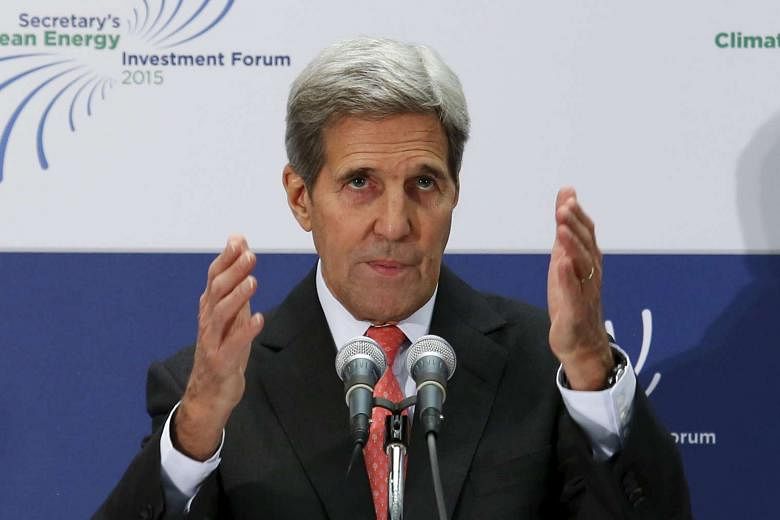BERLIN (AFP) - US Secretary of State John Kerry on Thursday (Oct 22) expressed "cautious optimism" after talks with Israel's Benjamin Netanyahu on defusing Palestinian-Israeli violence, as he urged all sides to "pull back from the precipice".
The meeting between the two was part of a flurry of diplomatic activity aimed at halting the cycle of violence, and came as another Israeli was wounded in a new knife attack near Jerusalem.
The latest unrest which erupted in earnest on Oct 1 has raised fears of a new Palestinian intifada, or uprising.
The Israeli leader had entered talks with Kerry in an unyielding mode, accusing Palestinian president Mahmud Abbas of inciting the wave of attacks.
But following the four-hour meeting, Kerry said he had "a cautious measure of optimism that there may be some things that could be, in the next couple of days, put on the table."
These "would have an impact, I hope, on the perceptions of everybody engaged that there is a way to defuse the situation and begin a way forward," he said.
Kerry said he spoke about several issues with Netanyahu that would now need to be raised with Abbas and Jordan's King Abdullah II, whose country is one of two Arab states which have a peace treaty with Israel and has previously played a key role in mediation.
"If parties want to try - and I believe they do want to move to a de-escalation - I think there are sets of choices that are available," he said, expressing hope that "we can seize this moment and pull back from the precipice."
- Arab leaders' responsibility -
In the latest incident, an Israeli was wounded in a knife attack in Beit Shemesh, west of Jerusalem, on Thursday before police shot and "neutralised" the two assailants.
Both attackers had tried attempted to board a bus but were prevented by passengers. They then stabbed a 25-year-old passerby before being fired on by officers.
Since Oct 1, at least 49 Palestinians and one Israeli Arab have been killed, including alleged attackers. Eight Israelis have been killed in attacks.
Alarmed by the wave of violence, world leaders including UN chief Ban Ki-moon have rushed to meet with both Israeli and Palestinian leaders.
Ban had on Wednesday said he was "not optimistic" after the talks to get both sides to pull back from a "dangerous escalation".
He travelled to Amman on Thursday where he met Abdullah and stressed "the responsibility of Arab leaders to encourage calm and to ensure that this crisis does not get out of control".
In Berlin, Netanyahu was to meet separately with German Foreign Minister Frank-Walter Steinmeier and the EU's top diplomat Federica Mogherini.
He has so far shown little appetite for compromise, accusing Abbas of fanning the flames and rejecting allegations that Israel has used excessive force in separate talks with Ban and Chancellor Angela Merkel.
"There is no question that this wave of attacks was driven directly by the incitement, the incitement of Hamas, the incitement of the Islamist movement in Israel and the incitement, I am sorry to say, from president Abbas and the Palestinian Authority," said Netanyahu.
"I think it is time for the international community to say clearly to president Abbas: stop spreading lies about the state of Israel," added Netanyahu, who stirred up controversy himself earlier this week by claiming that it was a Palestinian religious leader, the Grand Mufti of Jerusalem, who gave Adolf Hitler the idea of exterminating the Jews.
Merkel promptly moved to stress Germany's own culpability in the Holocaust.
"Germany abides by its responsibility for the Holocaust," she said, standing next to Netanyahu at a press conference.
- Al-Aqsa flashpoint -
Speaking to the Security Council by videolink on Wednesday, Ban delivered a sobering assessment of prospects for a return to calm, saying there was no time to waste. Details of his update, which was presented behind closed doors, were relayed by a diplomat.
He also presented a report on international protection after the Palestinians called for the deployment of an observer force in occupied and annexed east Jerusalem.
Seen by AFP, the report outlines 17 cases - from Trieste after World War II to Kosovo in 1999 - when the Security Council stepped in and set up special regimes to guarantee the protection of civilians.
Following talks with Ban on Thursday, Abdullah reiterated his warning to Israel against any move to change the status quo at the flashpoint Al-Aqsa mosque compound in Jerusalem's Old City, which is known to Jews as the Temple Mount.
Clashes there between Israeli security forces and Palestinian protesters triggered the latest round of violence.
Netanyahu has repeatedly accused Abbas of incitement by suggesting Israel wants to change the rules governing Al-Aqsa compound, sacred to both Muslims and Jews.
The Israeli leader says he has no intention of changing the rules.

